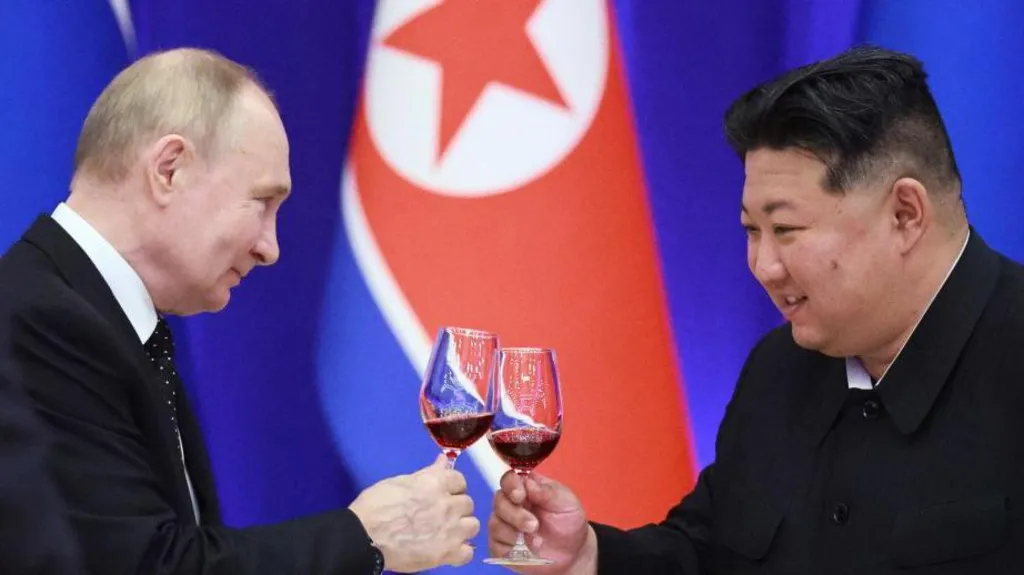Kim Jong Un Celebrates Putin: A Strengthening Alliance
3 min read
Kim (R) and Putin (L) toasted their friendship when they met in North Korea in June

Kim (R) and Putin (L) toasted their friendship when they met in North Korea in June
North Korean leader Kim Jong Un recently extended warm birthday wishes to Russian President Vladimir Putin, hailing him as his “closest comrade.” In a message celebrating Putin’s 72nd birthday, Kim expressed optimism about elevating the relationship between North Korea and Russia to a new level, highlighting the deepening ties between the two nations since the onset of the Ukraine conflict—a development that has raised concerns in the West.
On the same day, Kim also reaffirmed his commitment to accelerating North Korea’s military ambitions, particularly in the realm of nuclear weaponry. According to Yonhap News, which cited North Korean state media, Kim characterized the friendship between the two countries as “invincible and eternal,” emphasizing the positive influence of their meetings on the enduring bond between the Democratic People’s Republic of Korea (DPRK) and Russia. He referred to this relationship as a vital foundation for mutual cooperation.
Historically, the ties between North Korea and Russia date back to the days of Stalin and Kim Il-sung, Kim Jong Un’s grandfather. The Soviet Union played a crucial role in supporting North Korea during its formative years by providing military technology and assistance. Despite their longstanding partnership, North Korea has consistently sought to avoid over-reliance on China, a neighbor it perceives with skepticism.
In a notable agreement signed earlier this year, both leaders pledged mutual support in the event of “aggression” against either nation, although specifics on what would qualify as aggression remain vague. This pact further cements their cooperative stance amid increasing geopolitical tensions.
There are growing allegations that North Korea has been supplying Russia with munitions to aid its war efforts in Ukraine, possibly in exchange for economic and technological assistance. Reports indicate that North Korean missiles are being deployed by Russian forces in the conflict, suggesting a deepening military collaboration.
For Putin, the alliance appears to be more tactical than strategic. He is in dire need of support for his military campaign in Ukraine, and North Korea is ready to provide whatever arms it can in exchange for financial compensation. As Jeffrey Lewis, director at the James Martin Center for Nonproliferation Studies, noted, both leaders are attempting to mitigate the impacts of international sanctions by forging a network of alliances that circumvent U.S. restrictions.
North Korea stands to gain significantly from access to Russian military technology, which, despite its own challenges, is far more sophisticated than the weapons systems developed by Pyongyang. Over the past decade, North Korea has made notable strides in advancing its missile programs and miniaturizing its nuclear devices. However, Russia possesses advanced designs for thermonuclear warheads, re-entry vehicles, and solid rocket motors that could enhance North Korea’s capabilities.
During Kim’s visit to Russia in September 2023, Putin committed to assisting North Korea in satellite development, particularly following a series of failed launch attempts by Pyongyang. This cooperation underscores the potential for Russia to help North Korea enhance its technological capabilities.
In a related development, a South Korean lawmaker recently reported that South Korea’s military had detected indications that North Korea may be constructing a nuclear-powered submarine. According to Rep. Kang Dae-sik, the construction is in its preliminary stages, and further verification is necessary to determine whether the vessel will indeed be nuclear-powered.
Overall, the burgeoning relationship between North Korea and Russia reflects a complex interplay of mutual interests. As both nations seek to bolster their military capabilities and navigate a challenging international landscape, their partnership is likely to continue evolving, with implications for regional security and global geopolitics.